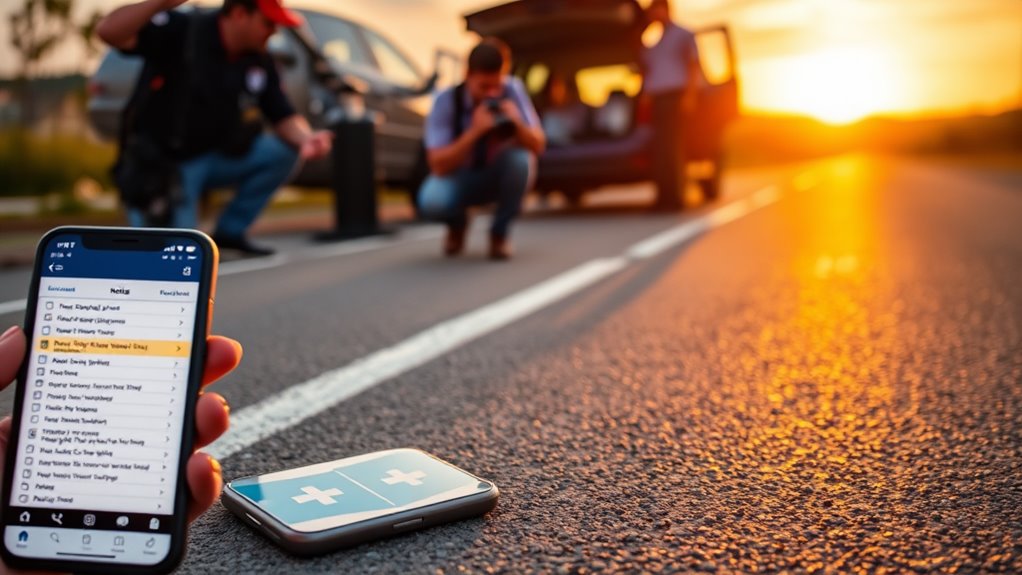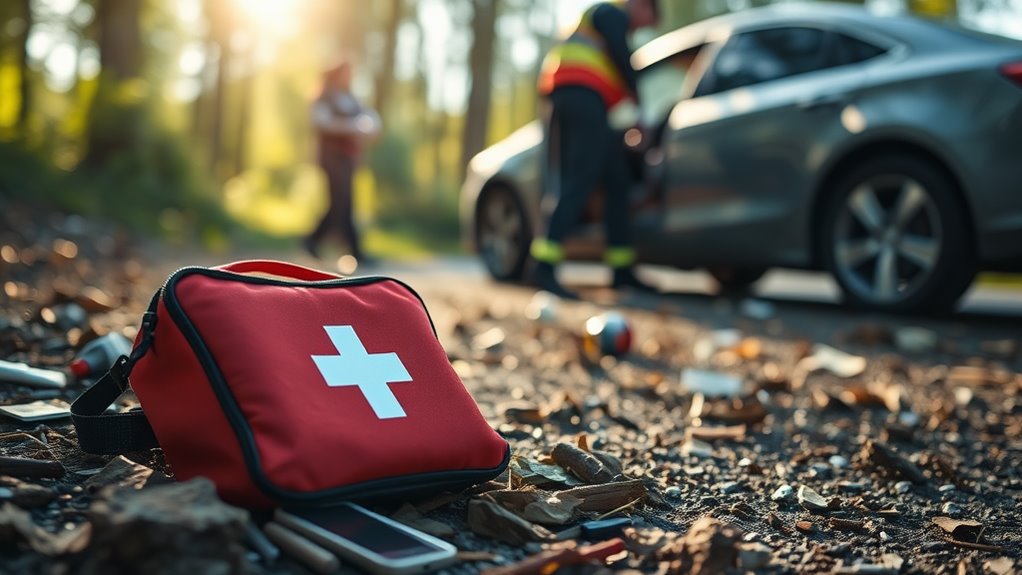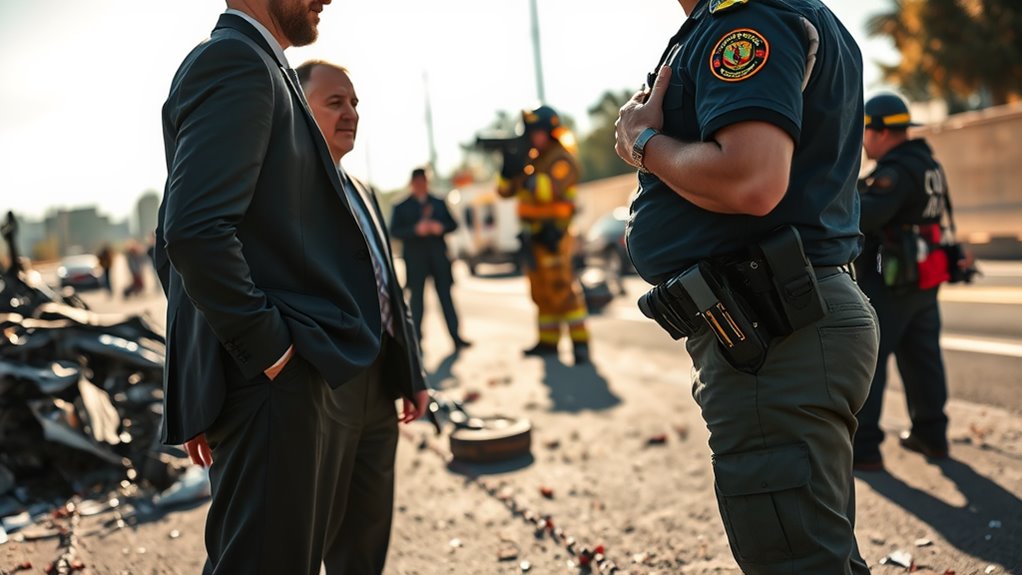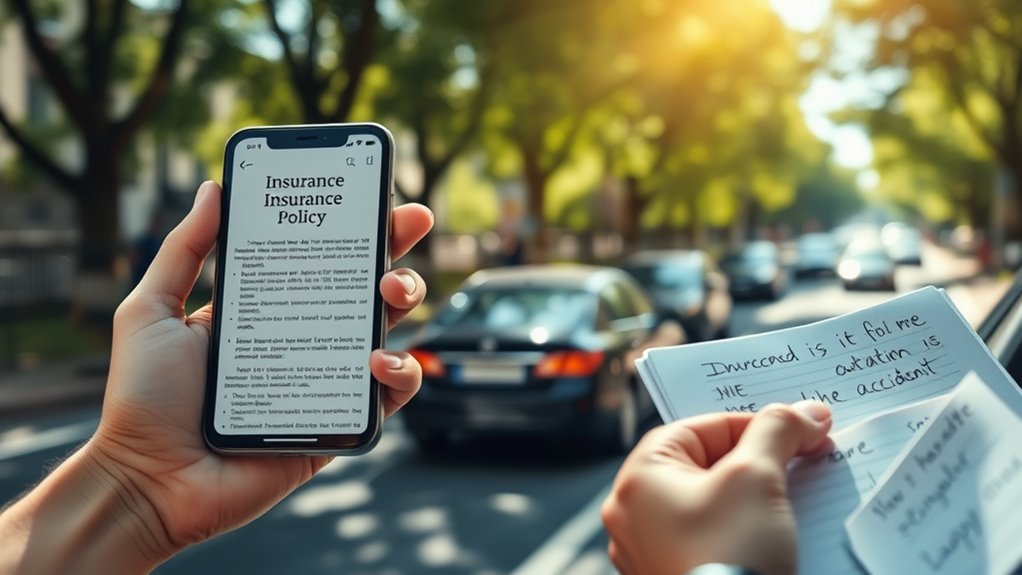
After a crash, it's crucial to safeguard your rights to guarantee a fair recovery. You might feel overwhelmed, but taking the right steps can make all the difference. From prioritizing your safety to understanding your insurance options, each action you take matters. It's not just about immediate reactions; it's about long-term protection. So, what should you do first to set yourself up for success? Let's explore the best ways to navigate this challenging situation.
Key Takeaways
- Document the accident thoroughly, including photos, witness statements, and police reports to support your claim.
- Exchange insurance and personal information with the other driver to ensure proper documentation.
- Seek medical attention for all injuries, and keep detailed records of treatments and expenses incurred.
- Notify your insurance company promptly and understand your coverage options and rights.
- Consult with legal counsel before accepting any settlement offer to ensure you receive fair compensation.
Prioritize Your Safety and Health

After a crash, prioritizing your safety and health isn't just important—it's vital.
First, check your vehicle's safety; if possible, move it to avoid further accidents. Then, assess everyone involved for injuries, recognizing that some may not be immediately visible. Having a traffic attorney can also help navigate the complexities that may arise after the incident.
Check your vehicle for safety and move it if necessary, then assess everyone for hidden injuries.
Calling emergency services promptly can provide essential medical assistance. Remember, adrenaline and stress can cloud your judgment, so stay calm. It's also important to ensure that all passengers are wearing their seatbelts to reduce the risk of serious injury during the crash.
Be vigilant about potential hazards, like fuel leaks—no smoking near the scene! Even if you feel fine, seek medical attention for all injuries, as they might worsen over time.
Document your injuries and follow any medical advice given. Taking these steps guarantees you protect both your physical and mental well-being after the crash. Your health should always come first.
Gather Essential Information at the Scene
Gathering essential information at the scene of a crash is crucial for protecting your rights and ensuring a smooth claims process. Start by exchanging personal details with the other driver, including names, contact information, and insurance details.
Don't forget to gather information from passengers in all vehicles and secure contact information from witnesses. Record the names and badge numbers of responding police officers, too.
Document the make, model, and license plate numbers of all vehicles involved. Additionally, note the accident's date, time, and location, as well as any relevant weather or road conditions.
Collecting this information helps establish a clear account of events, making it easier to advocate for yourself during the claims process.
Document Damage and Evidence Thoroughly
Documenting damage and evidence thoroughly is essential for protecting your rights after a crash. Start by taking multiple photos of all vehicles involved from various angles, capturing their damages clearly.
Don't forget to note road and weather conditions, as they can play a significant role in your case. Document any skid marks, debris, or property damage with pictures, and collect witness contact information to strengthen your claims.
Use your phone for quick videos, and check for any security camera footage nearby. Keep everything organized—maintain an accident journal, track medical treatments, and document all communications with insurance companies.
This thorough evidence collection will be invaluable in ensuring you receive the compensation you deserve.
Interact With Authorities Factually

When you interact with authorities after a crash, sticking to the facts is essential for protecting your rights and ensuring a smooth process. Provide clear, accurate details about the accident—its location, time, and conditions.
Stick to a sequential recap of events without speculation, and identify all parties involved. Stay calm when answering officer questions, and only share key details without volunteering extra information.
Always ask for the officer's badge number and if an official report will be filed. Remember, avoid admitting fault or engaging in personal conversations.
Respectful interaction goes a long way in these tense situations, helping you maintain your rights while ensuring the process unfolds smoothly.
Seek Prompt Medical Attention
How quickly you seek medical attention after a crash can greatly impact your recovery and legal standing.
Even if you feel fine, hidden injuries like whiplash or internal damage may not show immediate symptoms. Prompt medical care allows for early diagnosis and correct treatment, reducing the severity of injuries and improving your long-term health prognosis.
Furthermore, timely medical documentation provides clear evidence of your injuries, which is essential for supporting your personal injury claims.
Delaying treatment can lead to complications, extended recovery times, and even long-term damage.
Don't risk your health or your case; prioritize seeking medical attention right after a crash to safeguard both your physical well-being and your legal rights.
Keep Detailed Records of Medical Care
In the aftermath of a crash, keeping detailed records of your medical care can be a game-changer for your recovery and legal claims.
These records provide essential evidence of your injuries and treatments, directly linking them to the accident. By tracking your medical history, medications, and diagnostic tests, you can demonstrate the severity of your injuries and the necessity of your care.
Detailed medical records are crucial for demonstrating the link between your injuries and the accident, showcasing the necessity of your care.
This documentation is vital for calculating fair compensation, as it outlines your medical expenses and any lost wages due to your injuries. Additionally, thorough medical records can strengthen your case, helping insurers and courts understand the true impact of the accident on your life.
Don't underestimate the power of detailed records in safeguarding your rights.
Understand Your Insurance Rights

Understanding your insurance rights is essential after a crash, as it empowers you to navigate the often complex landscape of claims and compensation.
Familiarize yourself with your coverage types, like Personal Injury Protection (PIP), which pays for your medical expenses regardless of who's at fault. Know your liability insurance responsibilities and the protection offered by uninsured motorist coverage.
Be aware of your right to sue; depending on your policy, you may face limits based on injury severity. Always notify your insurer promptly after an accident, and be cautious when dealing with adjusters.
They may offer lowball settlements, so consider seeking legal advice before accepting any agreements. Your understanding of these rights can greatly impact your recovery.
Engage Legal Counsel for Guidance
After a crash, engaging legal counsel can greatly impact your recovery process and safeguard your rights.
From the very beginning, a lawyer can guide you through initial steps to protect your interests. They'll help gather critical evidence, such as police reports and witness statements, and assist in determining liability.
When dealing with insurance companies, having a legal professional at your side guarantees you won't be taken advantage of during negotiations. Attorneys also simplify complex legal processes and provide personalized guidance tailored to your situation.
If necessary, they're prepared to represent you in court, advocating for the compensation you deserve.
Don't navigate this challenging time alone; having experienced counsel can make all the difference in your recovery journey.
Protect Against Unfair Insurance Practices
Maneuvering the aftermath of a crash can feel overwhelming, especially when dealing with insurance companies that may not have your best interests at heart.
To protect yourself against unfair practices, be vigilant. Watch for red flags like unnecessary claim delays, unclear denial reasons, and unreasonably low settlement offers.
Be vigilant against unfair practices; watch for claim delays, unclear denials, and low settlement offers.
Document everything—take photos, gather witness statements, and keep a record of all communications with your insurer.
Never admit fault at the scene, and seek legal advice before accepting any settlement.
Remember, you have rights, including the right to fair compensation and legal representation.
If you suspect bad faith, don't hesitate to consult an attorney; you deserve to be treated fairly in this challenging time.
Negotiate Fair Settlements Assertively
Negotiating a fair settlement after a crash is essential for ensuring you receive the compensation you deserve. Start by gathering all significant evidence—police reports, photographs, and witness statements—that illustrate the accident's circumstances.
Compile your medical records, lost wages, and property damage reports to substantiate your claim. Accurately calculate total damages, including pain and suffering, and consider future medical needs.
Use effective negotiation techniques, like starting with a higher offer and crafting a detailed demand letter. Don't hesitate to hire competent legal counsel who can navigate insurance tactics and enhance your chances of a fair settlement.
Conclusion
In the aftermath of a crash, your rights can slip through your fingers like sand if you're not vigilant. By prioritizing your safety, gathering essential information, and seeking legal guidance, you can build a fortress around your recovery. Don't let the chaos of the situation overwhelm you; instead, stand firm and advocate for what you deserve. Remember, protecting your rights is not just a necessity—it's your pathway to healing and reclaiming your life.


